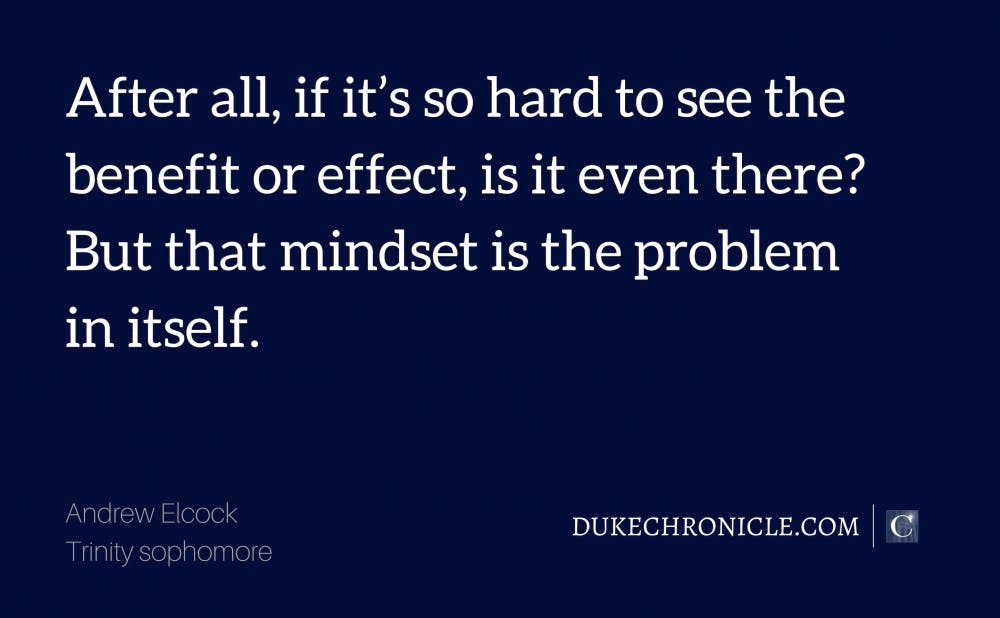Duke students care too much about themselves, and not enough about Duke’s community. Of course, this sentiment doesn’t apply to every Duke student and isn’t completely true for any single one. But as a whole, the student body at Duke is entirely more concerned with themselves, their friends, and their individual extracurriculars than with the culture and community at this school.
To some extent, this is human nature. We focus on what’s in front of us and will always be more concerned with our immediate issues than anything else. But part of what a college community ought to do is counteract that inward focus and draw people out of themselves to something greater, to a wider group of people connected on one campus. Right now, that is wholly lacking at Duke.
A student will attend rehearsal for their play every night for weeks, but not consider how the performance will impact the conversation at Duke. Instead, they do it as a self-contained process—whether for the people they act alongside, the fun they get from their participation, the knowledge they gain from the experience, or any number of other reasons. And those reasons are all perfectly valid, but each student should consider one more reason: the benefit their work will add into the community.
What exactly is “Duke culture,” then? It’s in the dominant conversations happening on campus: what you talk about at dinner in West Union or what you overhear on the C1. It’s in whether you try to form relationships with your professors or simply complete the class. It’s in the judgement or lack thereof when you choose to go to a Devils After Dark event rather than Devines. In short, it’s the way we all feed back into one another onto campus. Right now, that feedback loop exists, but it isn’t talked about. When we do something, we usually don’t try to affect it at all—but we should.
The perfect microcosm for this issue is Duke Student Government. Why does no one know what they do? Why did fewer people vote this year than last year—and in either case, why does that number only equal about a third of undergraduate students? Why did we only have one candidate for DSG vice president? DSG should play a much more visible role on campus, shaping the conversation and defining the culture. But since there’s little conversation or culture in the first place—or at least, no one care enough to think about what we currently have—the role of DSG is currently ineffectual.
This issue is much more pronounced at Duke because many Duke students are so career-oriented. If something isn’t listable as a bullet point on a resume, it may as well not exist. Which is why even as we raise thousands of dollars for donations or rebuild communities through DukeEngage (both great things Duke students should definitely continue to do), something as un-quantifiable as the “Duke culture” gets left by the wayside.
Of course, the easy answer is that we shouldn’t care about that side of our work, that what the whole Duke community gets out of our efforts is irrelevant. After all, if it’s so hard to see the benefit or effect, is it even there? But that mindset is the problem in itself. When we abandon any investment in the Duke community, we don’t get the dividends: the school-wide pride, the warmth of a tight-knit community, or the interplay between the efforts of diverse groups.
There is a reason I identify more with my sub-groups at Duke—my friends, my fraternity, my clubs—than with the school as a whole. Sure, Duke basketball takes some of that role: we almost all identify universally with the team. But I’m talking about school spirit; I want to identify with the institution of Duke, and I don’t right now. I’m trying to change that in myself, to be more mindful of the good I can give back to the whole campus, but it’s hard. It starts with this column, and hopefully continues in my role as philanthropy chair of my fraternity and in my work with the other clubs I’m in. The problem is that it’s much more difficult for me and everyone else to contribute to campus when the culture is one of apathy, not engagement.
We need to overhaul the culture at Duke, and it starts by talking about it. Once we can acknowledge and discuss what’s happening here, we can start engaging with it in our day-to-day activities. We can be mindful about how our extracurriculars will impact the community, or how DSG shapes the everyday life of Duke students—and what’s more, we can start taking steps to amplify that impact and make it more productive.
Andrew Elcock is a Trinity sophomore. His column usually runs on alternate Tuesdays.
Get The Chronicle straight to your inbox
Signup for our weekly newsletter. Cancel at any time.

